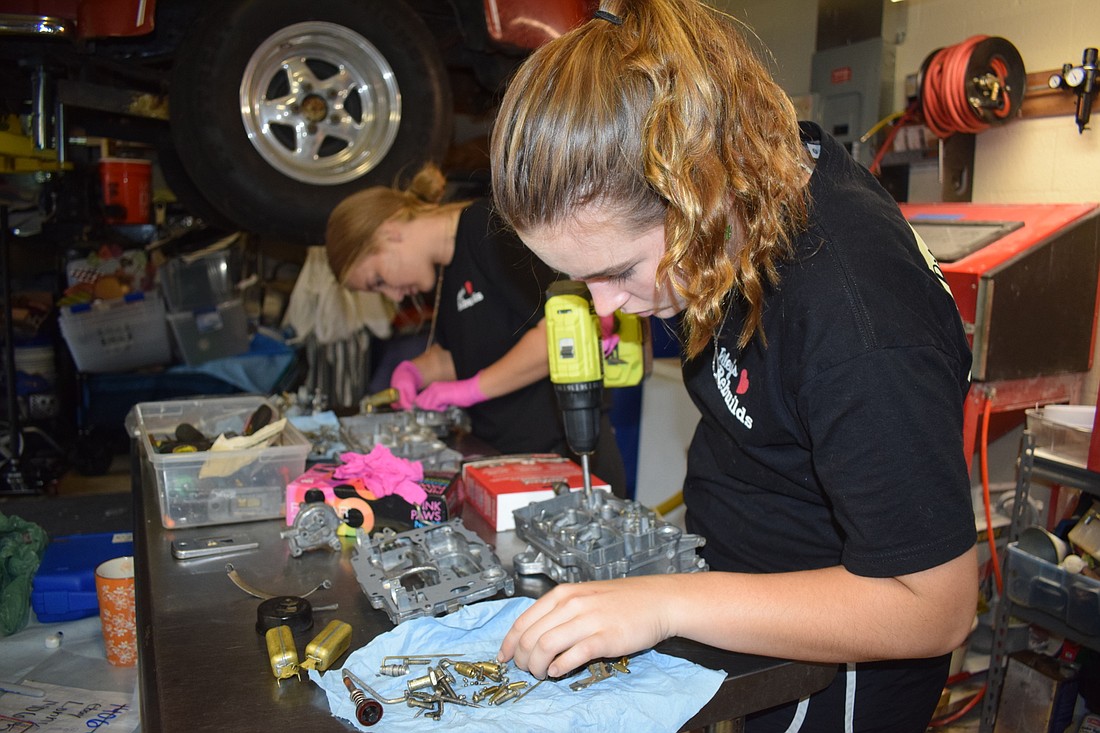- March 13, 2025
-
-
Loading

Loading

In some ways, it was a punch that punctuated Riley’s Rebuilds’ ascension into the world of rebuilt carburetors.
Sure, Lakewood Ranch’s Riley Schlick-Trask already had shown she had the skill and work ethic to build her own small business from scratch. Paired with her father’s car enthusiast mechanical skills, and his insistence she earn the money to buy her own first car, Schlick-Trask embarked on a successful endeavor, rebuilding carburetors in her Bridgewater garage at the age of 14 to earn those funds.
While most teens might turn to the service industry to find a job, she had been under the hood with her dad, Dane Schlick, since she started handing him tools at age 3. Over the years, she became more involved. If her dad, who has a collection of classic cars that include his favorite 1957 Chevy Nomad, was too big to get to a spot underneath the car, she would do it.
So when it came to finding her first job, she started looking around at car parts. After seeing a pile of used carburetors, she felt she could quickly become an expert at repairing them.
And she did.
She collected old carburetors, which regulate the fuel and air ratio for internal combustion engines, for either free or up to $50, and sold them for $200 or much more. With her father agreeing to a match anything she earned, it was only a matter of months before she found a “rat-infested” 1995 Jeep at Anderson RacePark in Palmetto to buy for $2,500.
“It was a nasty blue,” she said. “But it had a roll cage.”
The roll cage came at the insistence of her parents, Dane and Kara, who wanted her to buy something big and slow that had a roll-bar. With her dad’s help, they spent about $500 on parts, did the mechanical work, including a new transmission, to get it running, while a friend helped them repaint it.
Life was good for Schlick-Trask, who figured she could go back to concentrating on her competitive soccer, surfing and academics (a perennial honor society member). Rebuilding carburetors was profitable, but it would have to wait.
Then came the punch.
As her parents feared, it didn’t take long for Schlick-Trask to get into an accident, in this case rear-ending her friend’s 2012 Honda Accord. An angry Dagny Van Aken socked her.
Van Aken, who attends Saint Stephen’s Episcopal School of Bradenton with Schlick-Trask, said her aggression was deserved since her friend had “crushed my surfboard,” which was connected to the back of the car.
Schlick-Trask laughs about the incident now with kind of a “I deserved it” mentality, but it did change her direction. Suddenly she needed to raise $7,000 in car repairs.
So why not expand the carburetor rebuild business?
It was obvious if she needed a crew, why not enlist her friends who mostly were working minimum wage jobs? And why not include Van Aken, whose toughness under fire was apparent? Consider Schlick-Trask is a 6-foot goalie who is athletic and also has competed in wrestling and jiu jitsu.
Van Aken was working at Subway at the time but quit when she found rebuilding carburetors for her friend was more lucrative.
Now in business for three years, the 17-year-old Schlick-Trask has four employees, all her friends, in Van Aken, Catie Burgess, Elaine Zdancewicz and Amelia Sabo. All are Saint Stephens students except for Zdancewicz, who attends Lakewood Ranch High.
It’s strictly an all-girls operation, since the boys who have visited have tended to slow down the process.
“These are all good girls, hard workers,” Dane Schlick said. “And the girls can make as much money, or as little, as they want.”
Currently, the girls spend at least two nights a week working together. There are three basic jobs: breaking down the used carburetors, soda blasting them clean and then rebuilding them. Schlick-Trask assigns the tasks.
Actually, Zdancewicz said she is the “oddball” in the group as she only has rebuilt three carburetors. She handles the media responsibilities, editing YouTube videos and Facebook posts. All the girls are seniors except for Zdancewicz, who is a junior.
None of the girls expects to build carburetors, or to be auto mechanics, as their primary job in the future. But it’s good money now.
Schlick-Trask will take business classes at Connecticut College, where she said she will continue on rebuilding carburetors as a side job.
“I wanted to be a lawyer,” she said. “But I have dyslexia, and I didn’t want to read all day.”
While she might not be an auto mechanic as a main job, from it she has learned public relations, accounting, business and more.
Schlick-Trask says her rebuilt carburetor business has generated so much interest in social media that she receives inquiries on her work from all over the world.
“I was getting marriage offers,” she said of the interest. “I’ve been offered cows and chickens.”